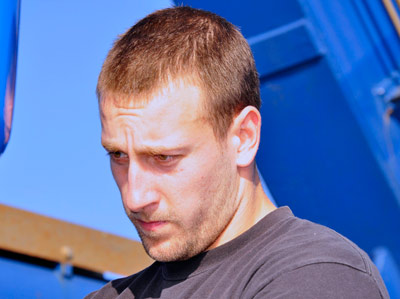Interview with Ben Tradd
by Cherie Winner
How do you get to be a pilot?
Usually you start out as an engineer, and that gets you really familiar with how everything works and what the different systems are, how to control them. Then we give someone a half-hour of stick time to begin with, to tell them how to drive the vehicle, and then we let them sit in. That gives you the basic overall feel for how the vehicle drives. It’s slower than a lot of people think. You have to learn how to account for that when you come in for a bottom approach—how to do it smoothly, without either crashing into the bottom or stopping 10 meters before you can get to the bottom.
How do you take all those flat images and assemble a three-dimensional image in your head of where Jason is?
That’s actually one of the harder things to do. That’s what makes you a good pilot versus just any old pilot, I think. Anybody can sit down in the seat and be told, ‘OK, drive to this point here.’ It’s not hard. Anybody could do it. I mean, anybody. But to be a good pilot you need to take into account everything that’s going on around you, and you have 18 monitors in front of you. Your head is on a constant swivel back and forth, looking at all the screens and taking in all that different information, processing it, and putting a 3-D image together. Especially when you’re manipulating the arms—you have to use different camera angles to put together a 3-D image of what you’re trying to grab. You have to be able to take in that whole big picture, and when you do that, you become a good pilot.
How does someone know whether they have that good spatial awareness?
Honestly, in that sense, I think video games really help. I’ve always been a computer gamer, since I was 10 years old. In a video game, you’ll do something like go through a hallway, then do your mission, and then you have to come back through that same hallway. So you have to put yourself into that map. And that really transfers over to driving the ROV [remotely operated vehicle], because you have to remember, ‘OK, I have a chimney behind me, maybe there’s a net over here, I flew between the two’—you have to keep all that in your mind at all times.
Is this something you dreamed of doing when you were growing up?
Actually, yes. When I was four or five years old, I wrote a letter to Bob Ballard saying ‘Wow, I think it’s really cool, I just watched your special on your discovery of the Titanic, what a cool job you have!’ And he wrote me a letter back saying, ‘Yeah, it was really an amazing thing to be a part of, and if you really like this stuff you should try to get into it.’ And so yeah, from then on, I was like, this is my dream job. I really want to do this, whether it’s with Alvin, driving the submarine, or with Jason, an ROV.
It’s amazing to have your dream job already at 25.
Yeah, it’s a little scary, actually. Where do you go after this? What if I don’t want to go to sea any more? I’ve thought about that. What’s going to top this for excitement? There’s not a whole lot, except become an astronaut. A little late for that I think, though.
What else do you do on the Jason team, besides pilot the vehicle?
One of my main jobs is to keep the system stocked with spares and supplies. I have a spreadsheet that’s probably 10 pages long, that’s just full of all the different parts and pieces that we need to keep the system working. Every time I do my inventory I’m like, ‘Wow, it’s unbelievable how much stuff we carry around.’ So that’s a full-time job in itself, making sure we have everything for the next cruise because as you know, there’s no Wal-Mart down the road, there’s no Home Depot to go get new tools.
What’s your favorite thing about being a member of the Jason team?
The travel is really awesome. I’ve seen a lot of parts of the world I never would have seen on my own, couldn’t have afforded to see. In the last three years, I’ve been all over the world.
What’s your favorite thing you’ve seen with Jason?
The volcano off of Tonga was pretty cool, but I think what takes the cake for me was the U-boat in the Gulf of Mexico that we did last year. We surveyed a German U-boat that was sunk in 1944, after it torpedoed an American ship carrying sailors home from leave in Puerto Rico. It had broken in half on the way down, but the deck guns were still there and the conning tower was still there. It was rightside-up in the mud. And the boat that it sank was about 500 meters away. That was probably the coolest thing I’ve seen.
That harkens back to your early interest in Titanic.
I think shipwrecks are actually my favorite part of the job. Seeing the hydrothermal vents, the volcanoes, the brine lakes and stuff, that’s really cool, but there’s something about a shipwreck. It’s more than just the wreck itself. You’ve got to think about the experience those people had before the ship went down. It’s intriguing.
|


